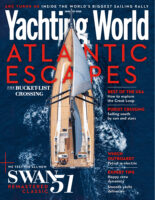An official statement from the RYA
The RYA is aware that the subject of breath testing for recreational boaters is an emotive subject for all concerned, whether they go afloat under power or sail. Opinions vary from applying the proposed regulations to all craft regardless of speed or size, to not bringing the proposed regulations into force at all.
It is important that all concerned voice their opinions, either through the press or otherwise, and also respond to the DfT consultation.
The RYA clearly does not condone anyone being in charge of a private recreational vessel while under the influence of alcohol or drugs. However, it is important that we keep this matter in perspective and remain focussed on the main issues, which include the issues of enforcement and the Government’s intent behind legislation.
The debate concerning breath tests for professional mariners has been going on for over 15 years, commencing with the inquiry into the “MARCHIONESS” disaster in 1989, the subsequent wider inquiry into river safety by John Hayes and the Marine Safety Agency/ Tavistock Institute Research Report entitled ‘Alcohol and Drug Abuse Aboard Ships’.
Notably, none of the above studies addressed the specific issue of alcohol and recreational boating so the current proposals cannot be in relation to an identified need.
Research carried out by the Government over more recent years indicates that there is no general problem with recreational drink/driving afloat that cannot be fully dealt with under existing legislation. For example, in 1998 the DETR working party on coastal byelaw powers concluded a two year study by publishing 59 recommendations for action. Alcohol abuse afloat by recreational boaters did not merit a single mention. In 1999 the DETR, after a year working with the ports industry, published its Port Marine Safety Code. Again, not a single reference to alcohol abuse afloat by recreational boaters.
We know of three recent cases where boaters have been successfully prosecuted following incidents and speeding offences in the Solent, where it was found they were navigating under the influence of alcohol. Consequently the RYA believes that existing harbour byelaws are sufficient to deal with alcohol abuse when it occurs.
Where harbour authorities are concerned about the mix of alcohol and recreational boating they have the power to introduce breathalyser rules, and this is exactly what the Port of London Authority did in 1992. So far as we are aware not a single private recreational craft skipper has failed a breath test in the 12 years since the rule came in, and we do not know of any similar byelaws in any other harbour in the UK.
If harbour masters, inland navigation authorities, coastal beach authorities are not calling for it, if the civil servants say it is not required, and the users do not want it, we ask why is the Government still insisting on this pointless and irrelevant legislation?
The RYA is also aware that enforcing the proposed regulations is going to be extremely difficult. The legislation is poorly drafted and we believe that it will be practically impossible to enforce successfully. The reasons for this include the various legal defences to a claim of ‘driving whilst under the influence’ that stem from the well-established responsibilities of a skipper. The RYA is currently seeking expert legal advice on this subject and we shall publish our findings shortly.
If the regulations cannot be enforced then it is bad law and we should not support it all.
With regard to the DfT consultation the RYA, along with the British Marine Federation and the Inland Waterways Association, were invited to meet with DfT Shipping Policy officials and asked to help formulate the questions that appear in the consultation document. As you would expect, our opening position was to challenge the need for this legislation at all on the basis of the above information.
All three organisations were informed that regulations were going to be brought into force regardless, and the new laws would reflect the intentions of Parliament that were expressed during the passage of the Railways and Transport Safety Act 2003. To avoid any doubt, the then Minister of State John Spellar MP stated that “it would not be [Government’s] intention to exempt persons operating very large recreational vessels, high powered motorboats or jet skis”. However the types of craft that Government wished to exempt included rowing and paddle boats, sailing dinghies (including those with small outboard motors) and narrow boats operated on the canal network.
Consequently the RYA has endeavoured to ensure that Government does not include craft within the proposed regulations that it was minded to exempt. Furthermore, in common with any consultation or debate, it was necessary to introduce datums or benchmarks as a starting point, and against which Government can assess the public’s response. With regard to the speed exemption, the RYA put forward the figure of 17 knots because this figure currently exists within the insurance industry where it appears in the ‘Speed Boat Clause’. It is therefore a tried and tested figure that lawyers and insurers are familiar with.
Ultimately, the RYA hopes that common sense will prevail and that we are not burdened with unnecessary and unenforceable regulation. To that end, we shall continue our efforts and lobby Government to prevent these regulations coming into force and continue to promote safe boating through education, not legislation.



